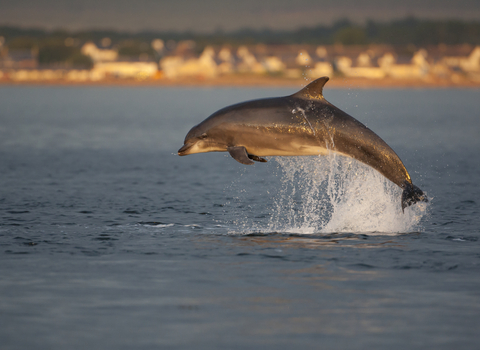A big splash for UK seas - our 2019 marine review
Together, the Wildlife Trusts form the UK’s largest marine conservation organisation. Our Living Seas teams are the eyes and ears of the UK’s coast. Throughout 2019, with the help of over 5,000 volunteers, they did wonderful things for the wildlife in our seas. Careful monitoring revealed some fantastic good news stories around our shores, from bumper breeding seasons to amazing discoveries.
A new citizen science project logged 320 sightings of cetaceans off Yorkshire’s east coast, including minke whales, bottlenose dolphins and harbor porpoises. There was good news for seals too, with Cumbria Wildlife Trust counting a site record of 483 grey seals at South Walney, including seven pups. Elsewhere, an individual seal, nicknamed Tulip Belle, was discovered commuting between the Isle of Man and Cornwall. Lara Howe, Manx Wildlife Trust’s marine officer, says: “It shows that seals will swim great distances for food and a place to pup, highlighting the importance of a network of Marine Protected Areas around the UK, so that wherever marine wildlife goes there are healthy seas to support them.”
Our fight to secure this network saw a huge victory last summer, with the designation of 41 new Marine Conservation Zones. 2019 also saw a welcome boost for some of our struggling seabirds. On Handa Island, Scottish Wildlife Trust counted 8,207 razorbills, the highest number since 2006, though the population is sadly still in trouble. In North Wales, Sandwich terns had a bumper year, with 800 chicks fledging compared to just 180 in 2018.
Sadly, it wasn’t all good news. Several Wildlife Trusts reported an increase in disturbance. Jet skis, kayakers, boats and drones have all been recorded causing distress to marine wildlife like dolphins, seals and seabirds. Plastics, ocean litter and discarded fishing gear also continue to devastate marine wildlife, though Wildlife Trusts around our shores cleared up huge amounts of litter, including 2.5 tonnes picked up by the Isles of Scilly Wildlife Trust.
All of this was made possible by the fantastic support of all our volunteers and members.
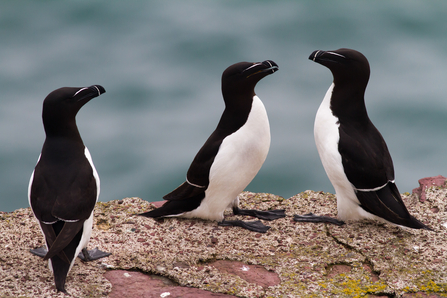
Razorbills ©Mike Snelle
100 miles wilder
Space for nature should be at the heart of our planning and farming systems. This is the only way we can create a Nature Recovery Network, enabling wildlife to thrive across the landscape and bringing nature into our daily lives. But current proposals for developing the land between Oxford and Cambridge do not have nature at their heart. Without proper assessment, government cannot know whether the area could support the current proposals for housing, road and rail and stay within environmental limits for nature, carbon and water.
Special habitats are under threat including ancient woodland and grazing marsh, which supports rare and declining wading birds like curlew and redshank. The Wildlife Trusts have created an alternative vision for this land: 100 miles of wilder landscape in which people can live, work and enjoy nature. By protecting and connecting the wildest places, we can introduce a new way of planning that has nature and people’s wellbeing at the centre.
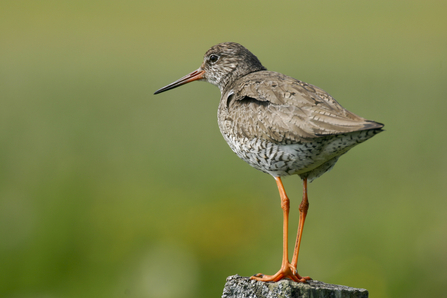
Redshank ©Tom Marshall
New leader for The Wildlife Trusts
The Wildlife Trusts are delighted to welcome Craig Bennett as their new Chief Executive Officer. One of the UK’s leading environmental campaigners, Craig joins The Wildlife Trusts from Friends of the Earth, where he was Chief Executive. In a conservation career spanning over 20 years, Craig has led a movement to end peat cutting on important moorlands, helped secured better wildlife legislation through The Countryside and Rights of Way Act 2000 and, more recently, led successful campaigns to highlight climate change and to protect and restore bee populations.
Craig Bennett says: “The Wildlife Trusts are an extraordinary grassroots movement that is uniquely placed to work with local communities to make this happen and ensure a wilder future, and I could not be more pleased to have been asked to lead them at this incredibly important moment.”
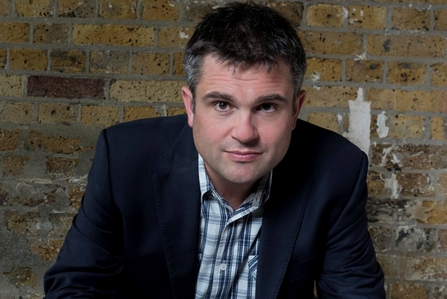
Craig Bennett joins The Wildlife Trusts a year into their Wilder Future campaign
An insect apocalypse
A new report, Insect Declines and Why They Matter, commissioned by an alliance of Wildlife Trusts in the south west, concluded that drastic declines in insect numbers look set to have far-reaching consequences for both wildlife and people. The report concludes: “if insect declines are not halted, terrestrial and freshwater ecosystems will collapse, with profound consequences for human wellbeing.”
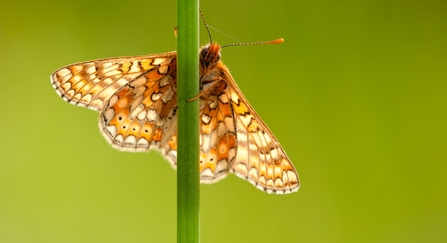
Marsh fritillary Ross Hoddinott/2020VISION
Wildlife news from across the UK
Inspirational youth, Ulster Wildlife
Over the last year, over 2,800 young people aged 11-25 rolled up their sleeves to help nature thrive in their local area. The Grassroots Challenge project, led by Ulster Wildlife, gave young people the opportunity to unleash their passion, creativity and potential to make a real difference to their environment and community. ulsterwildlife.org/news/inspirational-youth
Attenborough appeal, Nottinghamshire Wildlife Trust
Nottinghamshire Wildlife Trust launched an appeal to raise £1 million to safeguard Attenborough Nature Reserve, a wild oasis at the edge of Nottingham that’s home to large numbers of wildfowl. The appeal was supported by Sir David Attenborough and raised over £900,000 in the first month. nottinghamshirewildlife.org/lifelineappeal
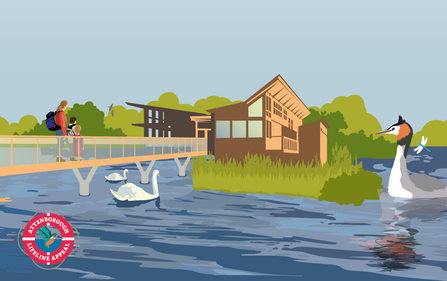
Spooky sighting, Devon Wildlife Trust
A ghost slug was discovered in the gardens of Devon Wildlife Trust’s Cricklepit Mill. The origins of this mysterious species are uncertain, but it’s thought to be a native of Ukraine. Since ghost slugs were first identified in the UK in 2007, there have been a scattering of sightings, mainly from South Wales. It’s a predator of earthworms and may cause problems for our native worms if it becomes established. devonwildlifetrust.org/news/ghost
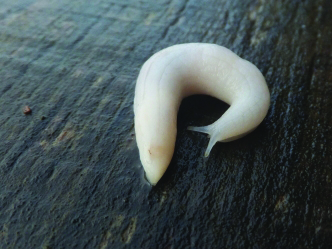
Ghost slug ©Phil Sansum

